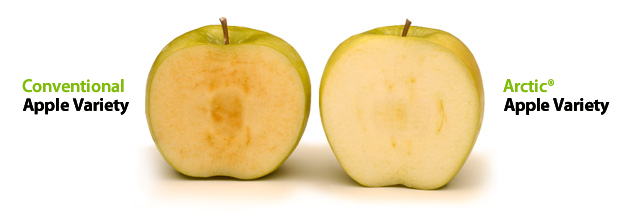|
SUMMERLAND, BC -- Genetically modified apples, developed in the Okanagan, soon will be sold for the first time in the United States.
Also read, Apple growers in Okanagan worried about possible apple maggot arrival. But it will still be a few years before Arctic brand apples are likely to show up at Canadian stores. “Our goal right now is to learn as much as we can from this test marketing exercise in the U.S.,” Neal Carter, the founder of Okanagan Specialty Fruits in Summerland, said Monday. “We’ve gone through all the logistics to get the product ready for market, and we’re excited to bring it to consumers and let them have a look,” Carter said. Arctic apples, which don’t brown after being bitten, bruised or sliced, have been well received at trade shows in the U.S., Carter said. “We’ve had many comments that they were the best-tasting apples at the shows,” Carter said. “Very, very rarely have we had someone won’t eat an Arctic apple because it’s genetically modified.” Carter developed a way to modify the gene that controls the apple’s browning after the flesh is pierced. Arctic apples were approved for sale in both Canada and the U.S. by regulators in 2015. The first shipment of Arctic-branded apples to market in February will be small, consisting of packaged fruit slices to 10 retailers in the U.S. Midwest. Wider distribution of Arctic apples is expected to take place in the U.S. this fall. “With the limited amount of fruit we have available right now, we’re not quite ready for the national retail market,” Carter said. The genetically modified apples are currently grown only in Washington state orchards owned by the company. Carter said a decision hasn’t yet been made whether to grow Arctic apples in Canada or bring the product into this country from the U.S. In either event, he said, it will likely be “a couple years” before Arctic-branded apple varieties appear in Canadian stores. After the U.S. Department of Agriculture approved the Arctic apple for sale, Okanagan Specialty Fruits was purchased by an American company, Intrexon, for $31 million in Intrexon stock and $10 million cash. The Canadian Food Inspection Agency has said of Arctic apples: “(They) are as safe and nutritious as traditional apple varieties.” Health Canada says: “The science behind the Arctic apple is quite simple. A gene was introduced into the Arctic apple that results in a reduction in the levels of enzymes that make apples turn brown when sliced. In every other way, the Arctic apple tree and its fruit are identical to any other apple.” For its part, the BC Fruit Growers’ Association has expressed concern about genetically modified apples from an economic, rather than food safety, perspective. The BCFGA fears a public backlash against all apple varieties as a result of the genetic modifications made to the Arctic apple, says association president Fred Steele. “Do I think you’ll grow a third eye if you eat an Arctic apple? Of course not,” Steele said. “But there’s science, and then there’s public opinion.” Genetically modified apples should be clearly identified as such when offered for sale in stores, Steele says. At their 2015 annual convention, BCFGA members passed a resolution opposing genetically modified apples, and that remains the group’s position, Steele said. The U.S. Apple Association originally opposed approval of genetically modified apples for reasons similar to the concerns expressed by the BCFGA. But that association is now neutral on the matter, reports Capital Press, a U.S. agricultural publication. SOURCE Ron Seymour, Kelowna Daily Courier
0 Comments
Your comment will be posted after it is approved.
Leave a Reply. |
Advertisement
News & Updates
Stay informed with the latest news around foodservice, agriculture and other related food news. Advertisement Opportunities
|


 RSS Feed
RSS Feed


